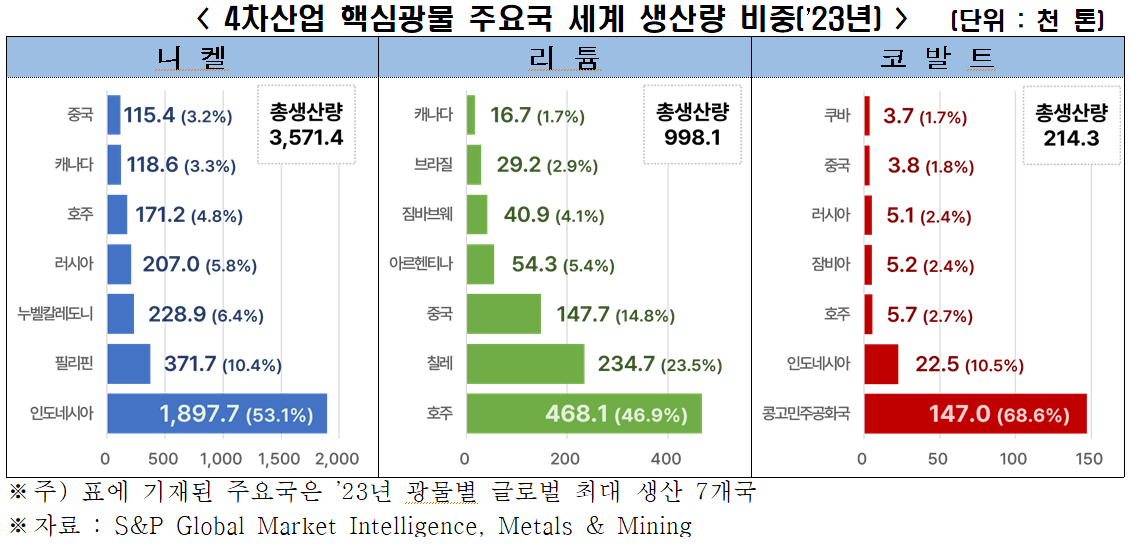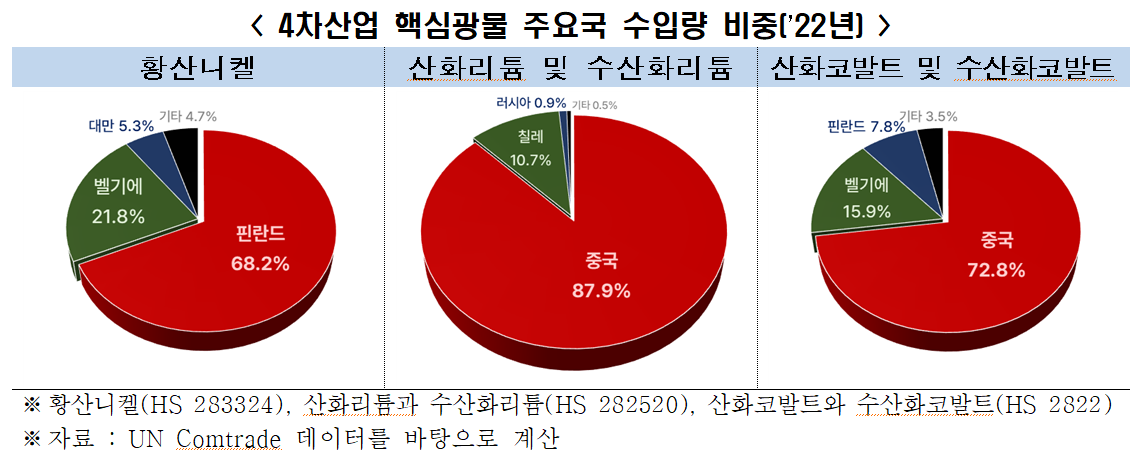한국경제인협회(이하 한경협)가 4차산업 핵심광물의 수입은 특정국에 의존하는 비중이 높아, 향후 공급망 리스크로 작용할 수 있다는 주장을 제기했다.
韓 기업 지분 보유 핵심광물 광산 36개·생산량 전세계 1% 이하
경제안보 차원 해외광산 지분 확대 및 민관협력 강화 필요
한국경제인협회(이하 한경협)가 4차산업 핵심광물의 수입은 특정국에 의존하는 비중이 높아, 향후 공급망 리스크로 작용할 수 있다는 주장을 제기했다.
또한 한국 기업이 지분을 보유한 국·내외 핵심광물 광산 수와 그 귀속 생산량이 부족한 것으로 나타났다.
한국경제인협회(이하 한경협)는 스탠더드앤드푸어스(S&P)의 글로벌 마켓 인텔리전스 데이터를 분석한 결과 한국 기업이 보유한 핵심광물 광산 수는 36개로 주요국에 비해 적고, 핵심광물 귀속 생산량은 전 세계의 1% 이하에 불과하며 핵심광물 특정국 수입 비중 지나치게 높다고 전했다.
2022년 기준 한국 기업이 지분을 보유하고 있는 핵심광물(동, 아연, 연(납), 철광석, 니켈, 리튬, 코발트) 광산 수는 36개인 것으로 조사되었다.
이는 국내에 풍부한 자원을 가지고 있는 중국(1,992개)과 미국(1,976개)뿐만 아니라, 국내 자원 부존량이 부족한 일본(134개)에 비해서도 크게 적은 수준이었다.

▲주요국 기업 지분 보유 핵심광물 광산 개수(그림 출처: 한국경제인협회 보도자료)
2022년 기준 한국 기업의 귀속 생산량(광산 총생산량 × 지분율) 비중은 핵심광물 7종 모두 전 세계 총합의 1% 이하에 불과했다.
반면, 일본 기업은 동기간 △동(4.1%) △아연(3.0%) △연(2.8%) △철광석(3.0%) △니켈(1.7%) △코발트(2.0%)에서 생산량 비중이 1% 이상으로 한국 기업보다 높았다.
.png)
▲한국, 일본 기업의 귀속 생산량 및 비중(그림 출처: 한국경제인협회 보도자료)
한국의 4차산업 핵심광물 특정국 수입 비중도 68~88%로 지나치게 높다.
한경협이 국가별 세계 생산량 데이터를 분석한 결과 4차산업 핵심광물인 니켈, 리튬, 코발트의 세계 생산량은 특정국에 편중된 것으로 나타났다.
2023년 전 세계 생산량 대비 △니켈은 인도네시아가 53.1% △리튬은 호주가 46.9% △코발트는 콩고민주공화국이 68.6%의 비중으로 세계 생산량 1위를 차지했다.

▲4차산업 핵심광물 주요국 세계 생산량 비중(그림 출처: 한국경제인협회 보도자료)
한경협이 UN Comtrade의 2022년 교역 데이터를 분석한 결과, 한국의 4차산업 핵심광물(원광이 아닌, 주로 거래되는 화합물 형태로의 수입량) 수입은 특정국의 비중이 큰 것으로 나타났다.
구체적으로 이차전지에 활용되는 △황산니켈은 핀란드로부터의 수입 비중이 68.2% △산화리튬과 수산화리튬은 중국으로부터의 수입 비중이 87.9% △산화코발트와 수산화코발트는 중국으로부터의 수입 비중이 72.8%에 달했다.

▲4차산업 핵심광물 주요국 수입량 비중(그림 출처: 한국경제인협회 보도자료)
한경협은 핵심광물이 경제안보와 결부되어 있어 안정된 수급이 중요하므로 국가전략적인 관점에서 해외 광산 지분을 늘리고, 민관협력을 강화해야 한다고 제언했다.
기존에 한국 기업은 주로 장기 공급 계약을 통하여 해외 자원개발에 진출하고 있으나, ‘지분 보유를 통한 핵심광물 확보’도 안정성과 지속가능성에서 우위가 있는 만큼 전략의 다각화 측면에서 매력적인 선택지가 될 수 있다.
또한 한경협은 핵심광물 확보를 위해 민관협력을 강화해야 한다고 강조했다.
일례로 일본은 정부가 공공 자원개발전문 독립행정법인(JOGMEC)을 설립하여 기업의 자원탐사 프로그램 단계부터 적극적인 투자와 채무보증을 실시하는 등 민관이 협력하여 광물자원을 확보하고 있는 중이다.
JOGMEC, 소지츠 상사의 호주 희토류 프로젝트에 공동 투자 진행(2011~2023)하였으며, 도요타 통상의 아르헨티나 리튬 프로젝트에 1억 4,800만 채무보증 실시(2019)한 바 있다.
이상호 한경협 경제산업본부장은 “기업이 핵심광물을 확보하려면 실제 생산이 시작되기 전 단계부터 막대한 초기 투자가 필요한게 현실”이라며, “민간의 해외 자원개발 투자에 대한 정책 금융 프로그램 강화, 자원 수출국 정부와의 국제 협력 네트워크 확대, 자원 확보의 컨트롤타워로 기능할 수 있는 민관 컨소시엄 조성 등 정부의 종합적 지원 패키지가 뒷받침되어야 한다”고 말했다.

.png)

